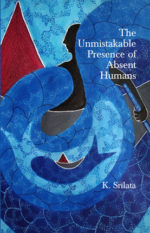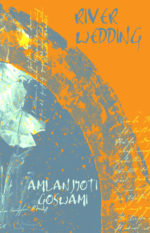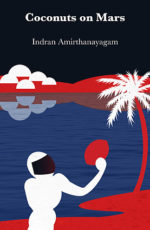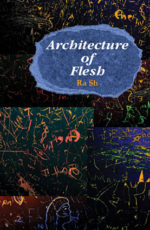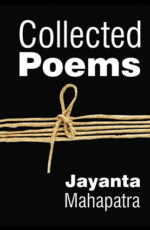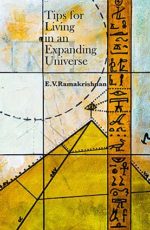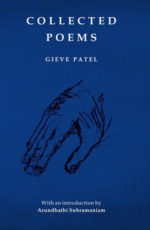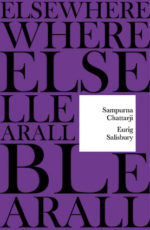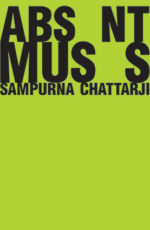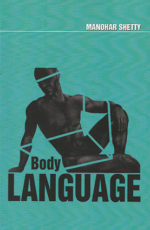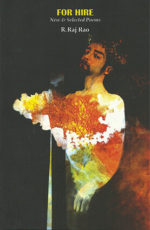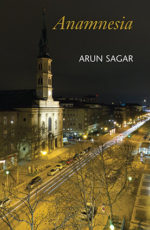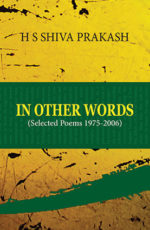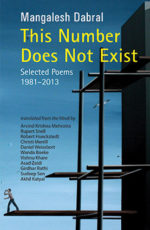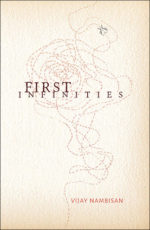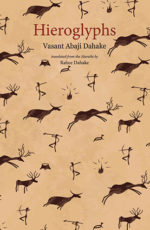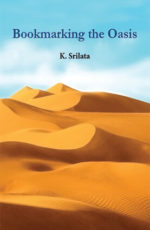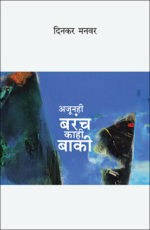-
The Unmistakable Presence of Absent Humans
$16About the Books
In a world of loss and absences, K. Srilata’s concerns go beyond the personal into larger issues of disappearing languages and people in conflict-ridden zones. Her sensitive eye for detail, the unexpected images and her use of language that can be both sharp and delicate, make these poems memorable. – Menka Shivdasani, Indian poet
K Srilata, in writing this important collection, has given voice to all who struggle to find meaning, who wonder endlessly what that other reality might be – the one that lies just beyond our reach, just beyond the picture frame. Her writing invites us to see the unanswered questions as doorways back into our lives. I love Srilata’s book, her light touch, her true poetic-voice, and her ability to catch a poem on the wing and transmit it to her willing and excited reader. – Murray, Poet and editor of Poethead
-
River Wedding
$16About the Book
The hundred pages of this collection give scope enough to show the generosity of Amlanjyoti Goswami’s perception of the world. This is both intimate and ambitious, paying attention to the gentle nuances of family life without losing sight of the disturbing ways that history unfolds. Moments of revelatory strangeness are often entered through a child’s viewpoint – ‘sunlight talks to Zenzi…’ – but the effect never sentimental. The whole collection could be dedicated, in the delicate wording of a poem simply titled Lunch: ‘To life, more life. // The kind that,like a child, / takes in a morsel, when nobody’s looking.’ The deeper messages speak quietly, but all the more convincingly for that, and the points of arrival are not grand visions but ‘a fine ordinariness’. What renders this quality fine is Goswami’s sure and economical way with language – ‘we wear the dusk of sorry news’, or the blind flautist’s sensation of ‘the grain in the wood, the press and leave / of my fingers’. There is no postcolonial uncertainty in this marrying of Indian perspectives and the English language, whose literary heritage is graciously acknowledged, with nods to Soyinka and Achebe, to Walcott and even (with a healthily wry smile) to Matthew Arnold when he turns up in a second-hand bookstall in Chandni Chowk. Rather, there is a generous welcome to the world – with the freshness of an outsider’s view sometimes, but always with a sense of hospitality. -Philip Gross
-
Coconuts on Mars
$12About the Book
Indran Amirthanayagam has been writing poems that will outlive his time, and they have been translated already into several world languages. These new poems both look bravely into the future as they turn back, at the same time, to the remembered mists of his childhood. Indran embraces various contradictions in his capacious heart and mind, that have enabled him to love in many languages, to cross all sorts of borders, geographic, linguistic, and political, and to champion liberty of expression wherever he goes. Indran?s is a journey beyond limits, and these poems take you much of the way along with him on his restless exploration of his multiple worlds.
-Shashi Tharoor -
Architecture of Flesh
$12About the Book
Ra Sh’s poems stand out in the world of Indian poetry in English because of their uniqueness in attitude and style. He has an eye for apt metaphors and ample adjectives that articulate the semantics of violence that have come to define our times: political, patriarchal and communal. The intensity of his concern perfectly matches the sharpness of his images. It is no wonder that his poems often seem like a ritual procession of self-flagellating devotees of a heartless god doling out selected torments or like aesthetic lessons in the anatomy of gore exposing the visceral asymmetries of existential angst. And during all the painful coitus, his poetry sings, yes, sings in many stabbing tongues invoking conversations in blood.
– K. Satchidanandan -
Cosmopolitician
$16About the Book
‘In his latest book Cosmopolitician, Mustansir Dalvi counters the outside world with poems seldom seen in the work of other poets. In seven sections; poems dealing with the larger scheme of life are conveyed in weighted words that are prevented from sinking by the structure and content into which they are placed. He is able to explore a wide range of styles and emotions that carry the reader away. And, as deep into the personal world as literature can take us: :My name is mud, / gold runs in my veins, grouting an imperfect dam that holds.”‘
– Jayanta Mahapatra, author of Sky Without Sky, A False Start and A Rain of Rites -
The Painter of Evenings
$20About the Book
Your poems are exceptional… My admiration grows for your poems – Jayanta Mahapatra.
Kottoor is a poet who has discovered his own voice distinct from that of his ancestors or his compeers. ? Dr Ayyappa Paniker
I earnestly believe that you are one of the most committed and ardent lovers of poetry. At my age (92), I would like to say—God bless you! With deep affection and admiration. – Shiv K Kumar
Gopikrishnan Kottoor is one of the most exciting voices of the 90?s.- Chandrabhaga
Thoroughly localized, yet universal. ? The Quest
-
COLLECTED POEMS
$60About the Book
?Mahapatra?s is an elite art, aimed at a small, discriminating readership.?- Bruce King
Jayanta Mahapatra is indisputably the most innovative, progressive and Anglophile poets of modern India. He is intrinsically touched by the stark realities of our country, and writes instinctively about ? hunger, myths, traditions, customs, rituals, love, passion, anger, frustration, sex, the self and the eternity, the socio-cultural diversity with adroitness. His extant work exudes post ?colonial leanings and spirit invariably. Post- colonialism refers to those theories in texts, political aspirations and modes of activism that spur to challenge structural inequalities and to establish social justice. Mahapatra?s poetry unravels many facets of post- colonialism as haunting past, search for identity and roots. Mahapatra writes to enliven the native tradition protesting the former colonizers and establishing national identity and integrity. He evokes the sense of Indianness both in content and form through his poetry relentlessly. His symbols and images are, however, evocative, suggestive and pivotal for linguistic versatility.- Mirza Sibtain Beg
-
Tips for Living in an Expanding Universe
$12About the Book
E. V. Ramakrishnan’s unique voice has reached another level of intensity in this new book of poems. He does not hark back to lost utopias or invoke dystopias. His poetry rips apart language to reach down to the palpable truth of experience. It aims at nothing short of the impossible: to hold together the ever expanding universe in an epiphany of the immediate.
-H.S. ShivaprakashE. V. Ramakrishnan?s poems spin across metaphor and statement with fluid ease, often veering at the edge of axiom. There is an ability to combine elegy and irony, image and indictment, to blur the distinction between the mundane and the make-believe while never losing the sharp knife-blade of moral concern.
-Arundhathi Subramaniam -
Collected Poems
$16About the Book
” … a poet who has been a quietly enduring presence in the country’s literary scene for five decades … ” “It was my first realization that a gaze unclouded by sentiment could evoke something truer than sympathy. That an unspoken poignancy could lie in the act of not averting one’s gaze. That poetry could lie in a simple unblinking intensity of attention.”
-
Elsewhere Where Else
$20About the Book
Sampurna Chattarji and Eurig Salisbury are two of the ten poets from India and Wales who took part in a project organized by Literature Across Frontiers and partners to mark the 70th anniversary of independent India. The poets collaborated to create new work and translate each other into their respective languages during a series of residencies in both countries, alternating between the hustle and bustle of Indian metropolises and the peace and quiet of welsh towns and rural locations. The project addressed, in a myriad ways, the theme of ?independence?. In artistic practice, independence means freedom to think, act and create beyond the confines of convention and economic necessity. But successful independence-of communities and individuals alike-also involves co-independence, collaboration and understanding across divides and differences. At a time of global change which sees increasing friction between identities, we hope this project has helped to open up a unique dialogue and formulate new narratives and ideas which both uncover and move beyond histories.
-
Absent Muses
$10About the Book
Cities So tell me. Is it hot? Does it rain? Are there places you can sit on a sunny day, away from the crowd? Is it beautiful? Is it loud? What do the streets smell like? What do the women wear? Are they pretty? Do you love it? Could you leave?
-
Body Language
$10About the Book
Elegy One by one they fall away, Some gently like brown leaves. Others with gnarled roots Hold fast to their Bleak and emptied plot To which no water or salt, Prayer or miracle can Grant another lease. But sure as the turning days, There will be
-
First Infinities
$12About the Book
Hell, or a state very much like it, does feature in Nambisan’s poetic underworld, which is deep, intricate and enticing. …… – From the Preface by Adil Jussawala Nambisan’s view of humankind is bleak, his view of the possibilities of poetry even bleak
-
Hieroglyphs
$29About the Book
Hieroglyphs is a translation of Sahitya Akademi Award winning collection in Marathi- Chitralipi by Vasant Abaji Dahake. It has been translated into the English by Rahee Dahake.
-
Bookmarking the Oasis
$15About the Book
The poems in Bookmarking the Oasis slide between water and land as they reflect on boundaries, partings, and the identities thrust on us. Luminous, quiet, courageous, Srilata’s poems plunge into the poetics of the everyday, recording fugitive moments with humour, irony and compassion. Nothing escapes the poet?s eye, whether the classroom’s tyranny for both teacher and taught, the blindness of experts, the vulnerabilities of childhood, or the volatile interiors of the human mind. Some poems draw on other poets’ voices, beginning conversations and uncovering strange resonances. Connecting it all is the image of the oasis, unexpected, delicious; a serene, fluid clearing in the mind, bookmarked for later, that allows poetry – and everything else – to happen
-
Ajunahi Barach Kahi Baaki
$16About the Book
This is Dinkar Manvar’s second collection of poetry. A very powerful voice in Marathi; the poems in this collection are hard-hitting and honest showcasing life at its honest best.

